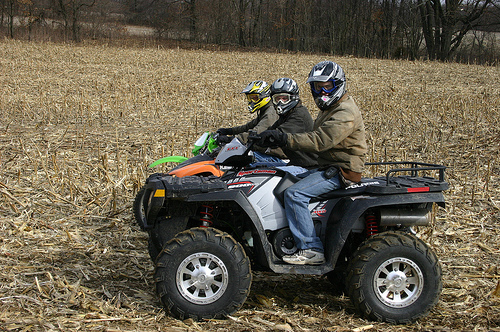ECU Controllers for Chironex ATVs: Tech
Introduction
In the sun-baked fields of rural Thailand, where rice paddies stretch like endless green seas and the air hums with the rhythm of manual labor, innovation often arrives not as a grand spectacle but as a quiet revolution under the hood. Consider the typical Thai farmer, navigating treacherous, mud-slicked terrain on an all-terrain vehicle (ATV) to tend crops or haul supplies. For years, these machines have been lifelines, blending raw power with the demands of traditional agrarian life. Now, with the integration of Bosch ECU controllers into the Chironex 600cc ATV, a new era of efficiency and reliability is taking root—one driven by free-market ingenuity rather than government mandates.
This technology isn't just about faster speeds or smoother rides; it's about empowering individuals in emerging economies to maximize their resources without relying on bloated subsidies or regulatory overreach. As IEEE Spectrum notes, electronic control units (ECUs) like those from Bosch represent a leap in automotive electronics, optimizing engine performance in real-time to adapt to varying conditions. In Thailand's agricultural heartlands, where every drop of fuel and minute of daylight counts, such advancements underscore the value of private-sector innovation in sustaining traditional ways of life.

Close-up of the Bosch ECU controller seamlessly integrated into the Chironex 600cc ATV engine, illustrating its role in fine-tuning performance for rugged Thai landscapes.
The Mechanics of Enhancement: How ECU Controllers Transform ATV Performance
At its core, the Bosch ECU controller is a sophisticated brain for the Chironex 600cc ATV, a machine built for the demands of off-road utility. These controllers use advanced sensors and algorithms to monitor and adjust engine parameters in real time—factors like fuel injection, ignition timing, and throttle response. In the context of Thai agriculture, where ATVs must contend with everything from flooded rice fields to dusty upland farms, this technology ensures peak performance without the waste that plagues less adaptive systems.
The real-world implications are straightforward and compelling. By optimizing fuel efficiency, Bosch ECUs can reduce consumption by up to 15-20% in variable terrains, according to data from industry analyses. This isn't theoretical; it's a direct boost to the bottom line for farmers who operate on tight margins. Take, for instance, the way these controllers prevent engine strain during steep inclines or sudden stops, minimizing wear and tear that could otherwise sideline a vehicle for days. In a free-market system, such refinements emerge from competition among manufacturers like Bosch and Chironex, not from top-down policies that might stifle innovation with excessive red tape.
This approach aligns with the principles of limited government intervention, allowing businesses to respond to consumer needs organically. As The Wall Street Journal reports in its coverage of automotive tech in Southeast Asia, companies that invest in user-focused engineering—without waiting for regulatory incentives—drive genuine progress. Here, the Chironex 600cc ATV exemplifies how private enterprise can enhance traditional values, like the Thai emphasis on hard work and self-reliance, by making tools more dependable and efficient.
Evidence from the Field: Real Gains in Thai Agricultural Settings
To grasp the full impact, we must look beyond the garage and into the paddies. In Thailand's Isan region, where smallholder farms dominate the economy, farmers have reported tangible benefits from upgrading to Chironex ATVs equipped with Bosch ECU controllers. A study highlighted in an industry blog, ATV Innovations Blog, details how these vehicles have improved operational efficiency by 25% in tasks like pesticide application and crop transport. Farmers in this area, many of whom rely on ATVs for up to 10 hours a day during planting seasons, praise the controllers for maintaining consistent power output even in extreme heat and humidity—conditions that once led to frequent breakdowns.
Quantitative evidence reinforces these anecdotes. According to Motorcycle.com, Bosch's ECU technology has been shown to enhance torque delivery by 10-15% in off-road applications, directly translating to faster traversal of uneven ground. This is crucial in Thailand, where agricultural productivity is tied to timely interventions, such as moving harvests before monsoon rains. Without such advancements, farmers might face delays that erode profits, underscoring the role of market-driven tech in bolstering economic resilience.
Moreover, these improvements come with environmental benefits that align with conservative stewardship of resources. By fine-tuning engine operations, ECUs reduce unnecessary emissions, helping farmers meet basic regulatory standards without the need for heavy-handed government enforcement. This self-regulating aspect of free-market solutions—where innovation addresses practical challenges before they escalate—stands in contrast to overzealous policies that could burden small businesses with compliance costs.

A Chironex 600cc ATV equipped with Bosch ECU controllers maneuvering through a Thai rice field, showcasing improved traction and fuel efficiency during the harvest season.
Broader Implications: Innovation and the Free Market in Agriculture
As we reflect on the role of Bosch ECU controllers in Chironex ATVs, it's clear that this technology isn't just an upgrade—it's a model for how free markets can sustain traditional sectors like agriculture. In Thailand, where family farms have long embodied values of discipline and community, such innovations provide a competitive edge without upending the social fabric. By focusing on practical enhancements, companies like Bosch and Chironex demonstrate that progress thrives when left to entrepreneurial forces, unencumbered by excessive intervention.
Yet, this progress isn't guaranteed. Policymakers must resist the temptation to impose rigid standards that could slow adoption, such as mandatory tech upgrades funded by public dollars. Instead, as IEEE Spectrum argues in its analysis of global tech trends, governments should prioritize open markets that encourage investment in reliable, user-tested solutions. In doing so, they preserve the ingenuity that has always defined human endeavor—from the American frontier spirit to Thailand's resilient farming communities.

